Like the Hugo and Nebula in America, the Galaxy is the highest honor in the Chinese science fiction spectrum, and for a long time, it was the only one.
The Galaxy Award was first established in 1986, by two magazines, Science and Literary (Ke Xue Wen Yi) – Science Fiction World (Ke Huan Shi Jie) today and Wisdom Tree (Zhi Hui Shu). After Wisdom Tree ceased publication, Science Fiction World became the only organizer of the Galaxy. The Galaxy was previously only awarded to works published on or by Science Fiction World, but is now open to all science fiction works published in China.
The award ceremony is held every year by Science Fiction World and it has always been in Chengdu, the foundation of Chinese science fiction, where Science Fiction World is located. This year it came to Shanghai for the first time.
In China, the largest science fiction related events are usually surrounding these award ceremonies because that’s when all the big names gather together. As a con person (not really a con person but an event person because we don’t have strong a con tradition in China!), I wouldn’t miss the Galaxy Award Ceremony on September 20, 2014 at the Shanghai Children Art Theatre.
This year, before the award ceremony, there was the Future Science and Technology Conference, a copycat of TED Talk, organized by a start-up company. The company lacks experience. They scheduled 24 talks in a single day in the same hall and announced the exact schedule with very short notice.
I had to get up at 7 am to catch up with the entry time. When I arrived, there was already a long queue outside. The venue is a theatre hall with around 1000 seats, 500-600 occupied that day, including all the audience, media and guests. No intervals but a short lunch break, no time-keeper, no professional host and IT support. To be honest, the Talk event was not well-organized, but the content of the talks was worth sitting through for the whole day.
Among all the 24 small talks, 6 impressed me most.
Li Miao, a theoretical physicist, talked about his thinking about future. He did not think the technological singularity will come within 30 years, and he worried about the energy shortage. According to Pareto principle, 20% of the population own 80% of the resources, which may cause severe resource distribution imbalance. In the future society, maybe we would only need 20% of the population to work, and the other 80% might become pets, pet human.
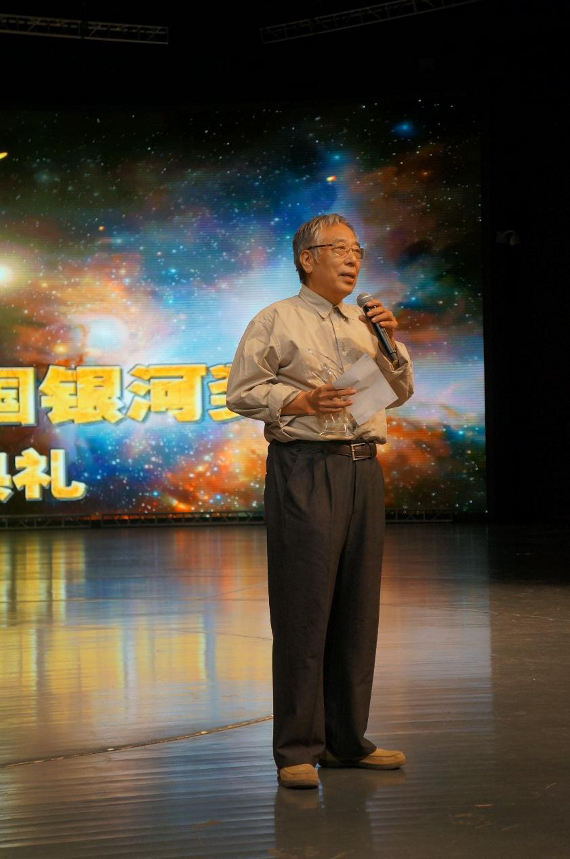
Han Song, a science fiction writer as well as a journalist, shared his thoughts about current trends in science and technology as well as the value of science fiction. He mentioned that the westerners and Japanese were investing in high tech while the Chinese were investing in real estates and winery. Are we Chinese so short sighted? No, at least not the science fiction people
Wang Jinkang, one of the most experienced science fiction writers talked about post-humanism. It was actually the first time I heard the term mentioned in Chinese. It has not become a hot topic in China yet, but Wang Jinkang started to voice concerns about the challenges brought by post-humanism in his New Human Tetralogy.

Chen Qiufan might be a familiar name to you. Several of his stories have been translated into English. He talked about how science fiction could help enterprises solve problems. Chen once worked for Google and now works for Baidu. He predicted the fluid cooperation model in future management. But what attracted me more was his SECT model for writing sf: the original cognition border was Shocked, thus the border Expanded, allowing the information that had been in blind zones to be exposed to cognition and Connected, from which we can abstract a model that could be Transferred and applied to different areas. Chen’s way of establishing models reminded me of my bachelor years when studying business administration. Business people are always good at using models and they rely on models so much, even if they were developed by a science fiction writer!
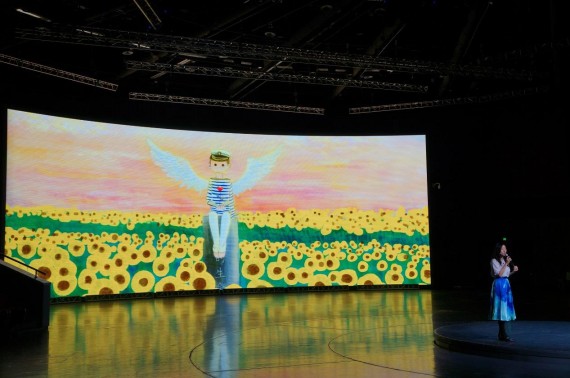
Xia Jia, our beautiful and brilliant female writer, shared her thoughts on time. She quoted Nullpointer’s theory of dividing time travel into 16 types by four dimensions: One way Vs Return travel, Mind Vs Body Travel, No Effect Vs With Effect on the past, Stable Vs Changeable Future. Grandfather Paradox and Butterfly Effect are the two most classic issues in time travel. Xia Jia explained Butterfly Effect and chaos theory by using her atmospheric physics knowledge. You may not know that she has got a bachelor degree in atmospheric physics, a master degree in film history and a PhD degree in comparative literature.
Yan Peng, a film critic specializing in sf films, regarded the limitation of sf film as the limitation of imagination, to be more specific, theme and world outlook. He thought that future technology would be the biggest challenge to sf films. When high-tech came into daily life, becoming low-tech, sf films would not exist anymore. That must be the last thing a science fiction fan wants to see.
After the Talk event, the award ceremony began with a video telling about the history of Science Fiction World and the Galaxy Award. The video was inspiring and touching. I burst into tears in the end. Several of my friends had the same feeling. SF AppleCore, the Shanghai fandom will work on the English translation of the video. Can’t promise when it will be done but we will try our best.
The award ceremony followed all the routines of an award ceremony. Announcement video, awarding words and awarded words, trophy and cheque. Yes, the winners got those giant cheques on the stage and the best novel winner got the biggest prize – RMB 100, 000.
You might be amazed by the high material compensation for the Galaxy Awards. It’s funded by Tianjin Weixiang (Storycom International Culture Communication Co., Ltd.) who has also supported the Chinese science fiction translation project of Clarkesworld, which ensures to publish one Chinese science fiction short story translated into English each issue.
After the awarding ceremony, it came to the signing session. There was at least a 100-meter queue in front of Liu Cixin, the writer of the Three Body Trilogy. I was scared away by the long queue (and also I have his signature), so I left with my friends for dinner. We walked away from the post-EXPO area, looking for a restaurant which can hold more than 30 people. Although we don’t have Dead Dog parties, we have post event dinners. It is always the best time of the whole event.
The complete list for the Galaxy this year is as followed:
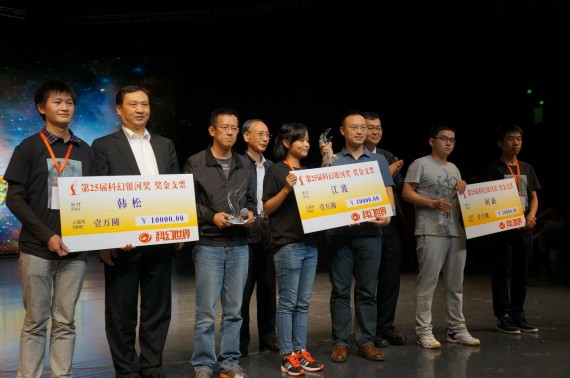
Best Short Story (RMB 10, 000):
Han Song, Age of the Elderly (韩松《老年时代》)
Jiang Bo, Wake up at Dust (江波《梦醒黄昏》)
A Que, Reaping the Childhood (阿缺《收割童年》)
Best Novella (RMB 20, 000):
Zhang Ran, The Windy City (张冉《起风之城》)
Best Noval (RMB 100, 000):
Wang Jinkang, Escaping the Mother Universe (王晋康《逃出母宇宙》)
Best New Writer (RMB 10, 000):
Chen Zijun (陈梓钧)
Best Translation (RMB 10, 000):
Wyrd Sister by Hu Shu(《女巫复仇记》胡纾)
Best Artist (RMB 10, 000):
Liu Junwei/Shark Dan (刘军威/鲨鱼丹)
Best Editor (RMB 10, 000):
Yang Feng, deputy editor-in-chief of Science Fiction World (杨枫,《科幻世界》副主编)
Most Popular Foreign Writer:
Ken Liu (刘宇昆)
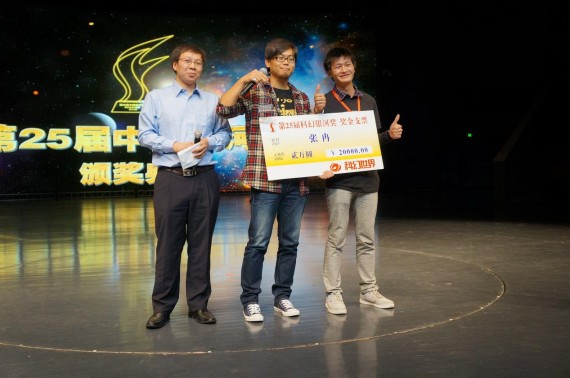
Best Original Book:
Escaping the Mother Universe, Sichuan Science and Technology Press & Science Fiction World(《逃出母宇宙》, 四川科技出版社、科幻世界杂志社)
Best Translated Book:
The Difference Engine, New Star Press(《差分机》, 新星出版社幻象文库)
Best Related Book:
Fly! The Great Qing Empire: Imagination and Science in Modern China, Beijing United Press & Motie Press(《飞翔吧!大清帝国 : 近代中国的幻想与科学》, 北京联合出版公司、磨铁–铁葫芦图书)
Best Game:
The Legend of Galaxy: Time Fleet (《银河传说:时空舰队》)
Best Screenplay:
Honey from the Star (《来自星星的Honey》)
Best Science Education Organization:
Beijing Green & Shine Foundation (桂馨基金会)
Fosun Charity Foundation (复星公益基金会)


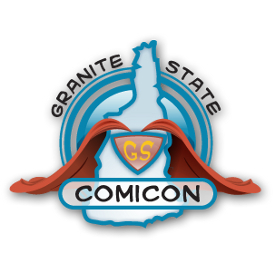








Welcome Regina, wonderful to find you here and thank you for the post, it is always interesting to see what is happening in other countries (and languages!) science fiction. I have a lot of questions, but perhaps I wait for your next posts, that I am sure some of my questions will be answer. Big hugs.
Thanks, Tanya! Thank you so much for introducing me to Amazing Stories.
Of course I will keep blogging on other stuffs that may answer your questions, but if not, feel free to ask: )
Big hug!